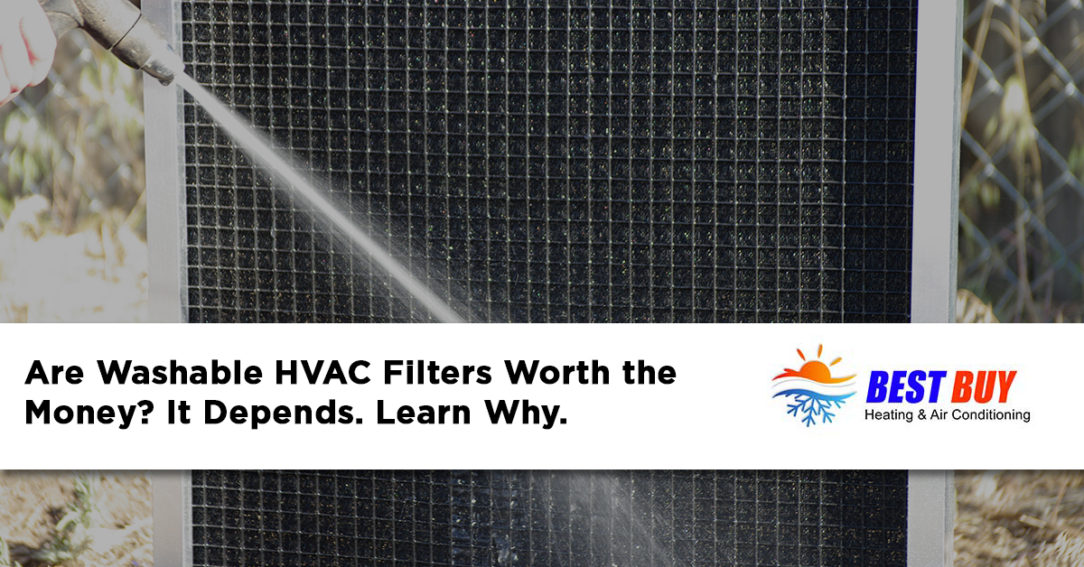If you’ve been reading the Best Buy Heating And Air blog for any length of time, you already know that the easiest and most affordable (yet very effective) DIY maintenance you can do is regularly replace the air filters in your HVAC system.
Clean air filters offer a ton of great benefits, including improved energy savings, increasing the lifespan of your HVAC system, reducing airborne allergens, and improving the air balance in your home.
With that in mind, today we’d like to discuss washable HVAC filters. Most homeowners simply purchase disposable HVAC filters, but reusable, washable HVAC filters are growing in popularity. For a larger upfront investment, washable filters generally purport to last at least as long as your HVAC system itself. This potential savings is attractive to many homeowners.
But is it worth it? How well do washable HVAC filters really work?
First, we need to understand what a MERV Rating is and why it’s so important to be able to read one before purchasing filters for your home (whether disposable or washable). Let’s see how it works:
What is a MERV Rating?

MERV is an acronym for Minimum Efficiency Reporting Value. Basically, it’s a measure of how effective your air filter is on a rating from 1 to 16. The lower the number, the less the filter catches; the higher the number the more can pass through it. What’s being caught? Things like pollen, dust, spores, pet dander, tobacco smoke, and so on. Please see this Wikipedia entry for a handy table that describes each MERV rating in detail.
However, here’s what you need to know in a nutshell: most homes will find more than adequate filtration with a filter rated between 7 and 12 on the MERV scale. 13 and up is typically used in medical settings (such as operation rooms, where the air needs to be ultra clean).
Something very important to note is that a higher MERV rating doesn’t necessarily mean that the filter is better for your system. Filters have a series of pores—this is how the air flows through them. Higher rated filters have smaller pores, and are thus able to catch smaller and smaller particles. The trade off here is that smaller pores on a filter create more resistance, which means that your HVAC system has to work that much harder to push air through them. With a high enough rating, this can lead to energy inefficiency (costing you more each month), and in some cases even damage to your HVAC system, which is more than likely equipped for residential filters somewhere in the 7 to 12 range.
…So, why is this important in our disposable vs. washable filter debate?
Because you need to take into consideration the MERV rating of your disposable filters and compare that to the MERV rating of a washable filter—which is typically lower. Let’s explore that concept.
Washable Air Filters Usually Have Lower MERV Ratings, But That Might Be OK

Washable air filters usually have a maximum MERV rating of 9. As we mentioned in the previous section, most residences have air filters with MERV ratings of 7 to 12, so if you get a higher end washable air filter, you’ll be well within that range.
As long as it’s above 7, you likely won’t notice any difference in air quality—unless you’re particularly sensitive to air particulates. In that case, you likely already use a higher MERV rated disposable filter, and you’ll probably be better off sticking with that rather than switching to a washable filter.
The other possible drawback of a washable air filter is the convenience factor. Instead of simply throwing them out and installing new filters, you have to wash them. This isn’t a terribly difficult process—follow the instructions for your particular brand of washable filter, but generally you’ll take them outside and hose them off.
Conclusion: Which is Better? Plus More Information for HVAC Maintenance in Windsor, CO
So, what’s the verdict?
As we said, it depends. If you aren’t particularly sensitive to air particulates, a lower MERV rated washable air filter can be a good way to save money on filter expenses (just remember to check the MERV rating table). Also remember that you’ll have to clean it yourself.
If you’re more sensitive, or just prefer a higher MERV rating, you’ll want to stick with disposable air filters—but remember that the higher the MERV rating, the harder your HVAC system will have to work and thus the less energy efficient it will be.
We hope that this has cleared up some of the misconceptions about washable air filters. Most manufacturer’s marketing will claim that they’re superior to disposable, much cheaper, and so on, but the real statistic that matters is the MERV rating.
If you have any questions or would like to have your HVAC system serviced in the Northern Colorado area, please feel free to reach out to us at (970) 218-0414 or request a service online.

Comments 3
LOOKING FOR WASHABLE FILTER 22.5X22.5X1/8
OR A
WASHABLE PERMANENT ELECTROSTATIC FILTER – ROLL
LOOKING FOR WASHABLE FILTER 22.5X22.5X1/8
OR A
PERMANENT ELECTROSTATIC FILTER – ROLL
THANK YOU